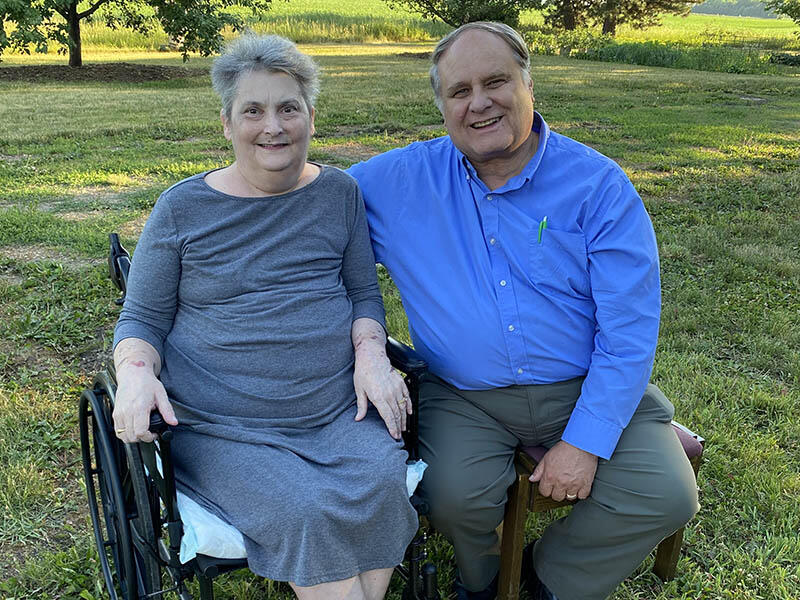Cancer patients at Sanford Health receive world-class care from a multidisciplinary team of providers and nurses. Those same patients still need care when they are at home though, and that caregiver is often a spouse, parent or child who spends their entire day providing for their loved one. So who takes care of the caregivers?
Sanford Health offers a cancer survivorship support group that meets regularly, designed specifically for caregivers.
Gregg and Monica Webster
Monica Webster was initially diagnosed with breast cancer in 2014 and was given about a 20% chance of living past six months. Aggressive chemotherapy, radiation and surgery helped save her life, but she developed a metastatic brain tumor in 2015, a second in 2016, and a third in 2020.
Monica, now 59, is still living with cancer, and by her side all the while is her husband, Gregg.
“One of the things that we quickly found out in this process was that, yes, there are a lot of people that deal with cancer, but there really are not a lot of people that understand the human side of things,” Gregg Webster said. “The medical stuff is talked about. The financial stuff is talked about, but the human side of things is really difficult.”
Gregg talked about some common issues that arise while providing 24/7 care, from basics like the best ways to administer medications, to work-related concerns like working around his wife’s schedule to take calls from his insurance clients. But there is so much more that Gregg, and caregivers like him, don’t necessarily consider at first glance.
“What are we doing to maintain our own health? Are we making sure we get enough sleep ourselves? Eating a healthy diet? Is there some kind of a way to provide us with a break if we’re feeling overwhelmed?” said Gregg, referencing many of the questions he and other caregivers often ask themselves. “It’s emotionally draining.”
On top of that, relationships with friends and family can change as well.
“(Family members) politely invited us to join them at a lake retreat,” Gregg recalled. “But my wife is in a wheelchair. It’s not gonna happen.
“When people do come and visit, a lot of times they cut it short. They leave early and they don’t come back, because they’re uncomfortable. People just don’t understand it.”
Cancer survivorship support group
There are caregivers all over the world who have the same concerns as Gregg, and there is no shortage of them in Fargo either.
Michael Burson, a senior social worker at Roger Maris Cancer Center, noticed caregivers in the waiting area of the center talking informally about some of their shared concerns, and decided to start a peer support group in 2019. Since then, the program has grown to be available across other communities that Sanford Health serves.
“I don’t come with topics. I let the group members come up with things they feel they need to discuss,” said Burson, who facilitates the group discussions. “As any good mental health person would say, the more we’re in the background, the more powerful the group is going to be. They’re the experts of their experience. So we just create the space for them to do the work.”
It doesn’t typically take very long for members of the group to find something they can relate to.
“I see light bulbs go off in every group and people kind of having those important ‘aha’ moments like, ‘Oh, I thought we were the only ones!’ That is a really cool dynamic of the group, and I love being a part of that,” Burson said. “There’s a lot of value to it. Even if people just come once or twice, I think they walk away with something that they didn’t have before.”
The Fargo group meets once a month, on Tuesday afternoons, for about 90 minutes. For those who can’t attend in-person, there is the option to join virtually as well. For his part, Gregg has been attending for three years.
“There’s a tremendous number of people out there that are just kind of blindly running through things on their own, trying to figure it out,” said Gregg. “It’s such a value to be talking with other folks that are going through something similar themselves, and truly understand it. We can learn from each other.”
Here for all
At Sanford Health, the goal is to take care of every patient. In the case of caregivers, their well-being is crucial not just to their own health and state of mind, but to their loved ones as well.
That’s why Burson considers the support group to be another crucial part of Sanford’s overall commitment to care.
“I think we provide excellent care to our patients,” Burson said. “I think we strive for excellence. So I would hope that the caregiver group would be a reflection of that. Caregiving is an extremely hard job. So I’m really happy to be able to add to that experience for the people that are going through this, and hopefully it positively impacts them.”
Learn more
- Podcast: Supporting the caregiver beyond the cancer diagnosis
- Prosper provides solutions, resources for caregivers
- Prescription assistance program offers discount medicine
…
